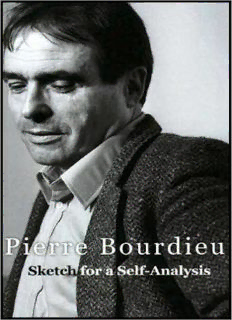
Sketch for a Self-Analysis PDF
Preview Sketch for a Self-Analysis
Sketch for a Self-Analysis PIERRE BOURDIEU Translated by RICHARD NICE The University of Chicago Press Chicago and London This is not an autobiography Pierre Bourdieu Contents Publisher's Note to the French Edition ix Sketch for a Self-Analysis i Index i14 Publisher's Note to the French Edition A sociological analysis excluding psychology, except for some moods. Pierre Bourdieu, preparatory notes This text, which Pierre Bourdieu wrote between October and December 2001 - but which he had worked and reflected on for several years, wondering in particular what form it should take - was conceived, starting from his last lecture at the College de France, as a new (extended and reworked) version of the last chapter of Science of Science and Reflexivity} And, to mark clearly the continuity between the two texts, he gave them the same title: 'Sketch for a self-analysis'. He had decided that the book should first be published in Germany" and, although he envisaged reworking it for the French edition, we have chosen to publish the German version, only adding some biblio graphical notes for the explicit references. Just as he had made his entry to the College de France with a very reflexive 'Lecture on the lecture','" so Pierre I Science of Science and Reflexivity (Cambridge: Polity, 2004). II Ein So{iologischer Selbstversuch (Frankfurt: Suhrkamp, 2002). jii Lecon sur la lecon (Paris: Editions de Minuit, 1982), trans, as 'A lecture on the lecture', in In Other Words: Essays towards a Reflexive Sociology (Cambridge: Polity, 1990), pp. 177-98. Publisher s Note to the French Edition Bourdieu decided to deliver his last lecture by subjecting himself, as if as a final challenge, to the exercise of reflexivity that he had defined throughout his life as a researcher as one of the necessary preliminaries to scientific research. He knew that to take himself as his object exposed him to the risk not only of being accused of self-indulgence, but also of giving weapons to all those who only wait for an opportunity to deny the scientific character of his socio logy - precisely on the grounds of his own position and his trajectory - and who do not see that the exercise of reflex ivity was built up over a long time as an instrument of sci- entificity. In this supremely paradoxical project, it was much less a question of an ostentatious gesture ('to summon the reader to ask himself why he is reading this', Pierre Bourdieu wrote in his preparatory notes) than of an entirely original undertaking that would finallyb ring the researcher into conformity with his conception of scientific truth, a will to give a kind of ultimate guarantee of the scientific charac ter of the propositions set out throughout his whole oeuvre, by means of a very controlled return upon himself ('I place the most objective analysis at the service of what is most subjective,' he also wrote, commenting on this text). It is clear now that he was right to fear the ill-use that could be made of it. In one of the early versions he wrote: 'This is not an autobiography. That genre is forbidden to me not only because I have identified and denounced the biographical illusion; it is also profoundly antipathetic to me, and the aversion mingled with fear that has led me to discourage several "biographers" is inspired by reasons that I think legitimate.' December 2003 Sketch for a Self-Analysis I do not intend to indulge in the genre of autobiography, which I have often enough described as both con ventional and illusory. I would simply like to try to gather together and present some elements for a self- socioanalysis. I do not conceal my apprehensions, which go far beyond the habitual fear of being misunderstood. I have indeed the feeling that, particularly on account of the scale of my path through social space and the practical incompatibility of the social worlds that it links without reconciling them, I cannot wager - being far from sure of achieving it myself with the instruments of sociology — that the reader will be able to bring to bear on the experi ences that I shall be led to evoke, the gaze that, in my view, is the appropriate one. In adopting the point of view of the analyst I oblige (and authorize) myself to retain all the features that are pertinent from the point of view of sociology, in other words necessary for sociological explanation and under standing, and only those. But, far from seeking to produce thereby, as one might fear, an effect of closure, by impos ing my interpretation, 1 intend to subject that experience, set out as honestly as possible, to critical confrontation, as if it were any other object. I am well aware that, analysed in that perspective, and as is appropriate all cases, in
Description: